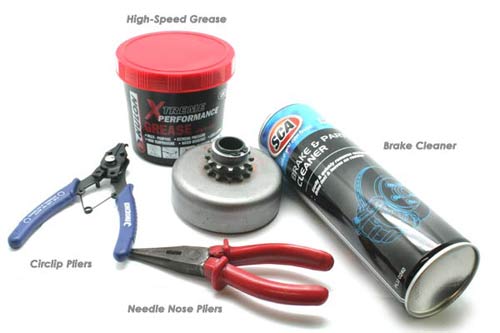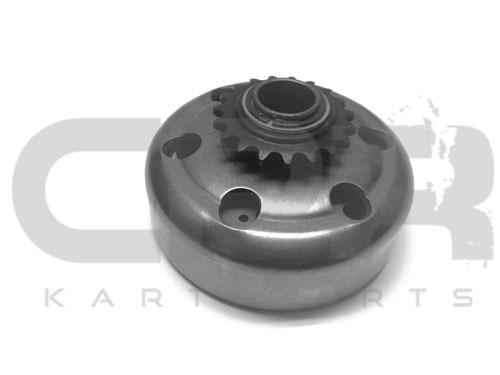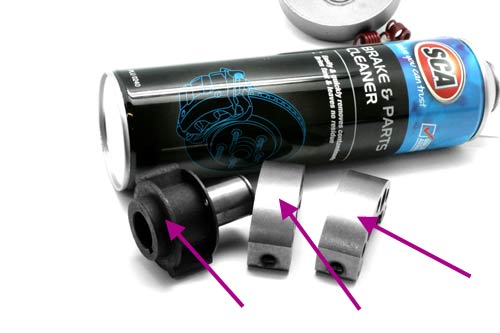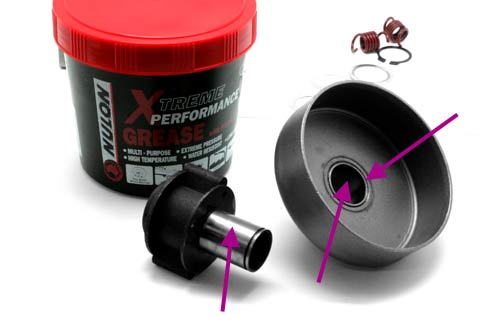GUIDE
Servicing NORAM GE Ultimate Clutches (Used on the KA Torini Clubmaxx Engine) - Disassembly and Assembly Tutorial
Home
::
GUIDE - Disassembling / Servicing / Assembling NORAM GE Ultimate (Torini Clubmaxx) Clutch
GUIDE - Disassembling / Servicing / Assembling NORAM GE Ultimate (Torini Clubmaxx) Clutch
GUIDE - Disassembling / Servicing / Assembling NORAM GE Ultimate (Torini Clubmaxx) Clutch
The NORAM GE Ultimate clutch is the same basic design as the CPR GT clutch and is assembled and serviced almost exactly the same way (the only difference being that the bottom thrust washer is replaced with two thrust washers and a roller bearing on the GE Ultimate). WANT TO READ THE CPR GT DISASSEMBLY GUIDE INSTEAD? CLICK HERE
In this guide we'll show you how to break down and re-assemble your NORAM GE Ultimate Twin Shoe clutch, and we'll also give you the tips and tricks to service it and keep it in the best operating order.
CONTENTS
1. Required tools and consumables
2. Remove the circlip
3. Remove the first thrust washer
4. Remove the Drum
5. Remove the thrust washers and bearings
6. Remove the Springs and shoes.
7. Remove the sprocket from the drum
8. Clean & check the clutch components
9. Lubricate the clutch components
10. Re-assemble the clutch
PARTS LIST
.jpg)
Click the underlined items below to find them in our store
A - Drum
B - Sprocket retainer circlip
C - Sprocket
D - Thrust Washer
E - Inner Sprocket Circlip Cover Washer
F - Circlip
G - Core
H - Shoes
I - Springs
This guide explains how to disassemble and re-assemble your CPR GT Clutch, as well as how to service it.
1. Required Tools and consumables
Ideally, you will require the following tools and consumables:
- Circlip pliers to remove the circlip (picks and screwdrivers can be substituted if circlip pliers are not available but be careful if using picks and screwdrivers as the circlip is under a lot of pressure)
- Needle nose pliers to remove and fit the springs
- Brake cleaner (to clean the shoe surface and other components of the clutch
- High speed grease to re-grease moving parts upon assembly

2. Remove the circlip
Using the circlip pliers, gently remove the circlip holding the drum to the core. Place it aside.

.jpg)
3. Remove the first thrust washer
Remove the first and second thrust washer and place aside. *NOTE: Thrust washers can vary in thickness. TOP TIP:When using different thickness thrust washers simply use the same quantity internally, then use a different quantity between the outer drum and the circlip to ensure almost no play in the drum.
.jpg)
.jpg)
4. Remove the drum
Slide the drum upwards and off the core. Place it aside - watch for any thrust washers stuck to the underside of the drum.
.jpg)
5. Remove the thrust washers and bearings
Carefully remove the first thrust washer, then the bearing, then the second thrust washer. Clean as necessary and re-apply grease to the roller bearing. Use only a thin smear of high speed bearing grease on the surfaces of each thrust washer.
.jpg)
.jpg)
.jpg)
5. Remove the Springs and shoes.
Using the needlenose pliers, gently lever each spring out from one of the shoes first, then remove one shoe.
.jpg)
Remove the second shoe from the core.
.jpg)
6. Remove the sprocket from the drum - firstly remove the circlip from the underside of the drum
.jpg)
Then remove the thin shim from the drum
.jpg)
Now you can push the sprocket out of the drum from the inside pushing outward. If you can't get it to budge, gently tap it with a nylon hammer.
.jpg)
DONE
8. Clean and check the clutch components
Using the brake cleaner, clean the section of the core and shoes. You can also clean the inside of the drum where the shoes contact if it is sticky or has been noisy in operation.
Check the contact surfaces and ensure they aren't burred or damaged. All shafts should be perfectly smooth and free from chips and marks.
If you notice any damage on your GE Ultimate clutch, you can buy all components directly from the store in the GE Ultimate Clutch section. (CLICK HERE TO FIND GE ULTIMATE CLUTCH PARTS)

9. Lubricate the clutch components
Using the high speed grease, VERY LIGHTLY grease the protruding knobbly bits on the core where the shoes are held in place - do not over-grease these as the shoes must be able to move easily and you do not want grease flicking out onto the shoes and drum contact surface.
Lightly grease the core shaft.
Lightly grease the bush in the drum and the section of the base of the drum where it will sit on the thrust washers. DO NOT OVER-GREASE!

10. Re-assemble the Unit
Re-assembly is basically the reverse of the disassembly process.

















